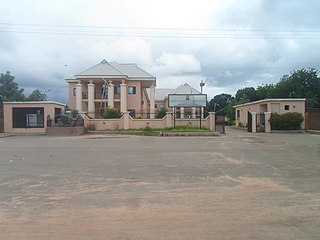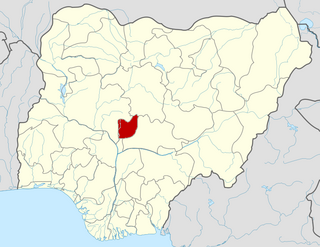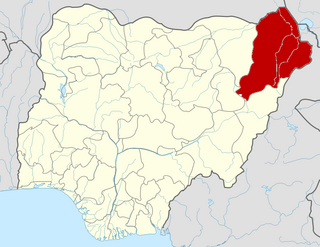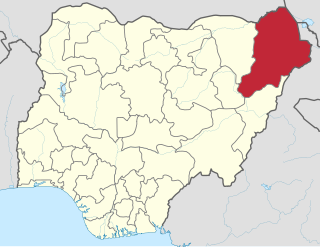Related Research Articles

Maiduguri is the capital and the largest city of Borno State in north-eastern Nigeria, on the continent of Africa. The city sits along the seasonal Ngadda River which disappears into the Firki swamps in the areas around Lake Chad. Maiduguri was founded in 1907 as a military outpost by the British Empire during the colonial period. As of 2022, Maiduguri is estimated to have a population of approximately two million in the metropolitan area.
This Day is a Nigerian national newspaper. It is the flagship newspaper of Leaders & Company Ltd., and was first published on 22 January 1995. It has its headquarters in Apapa, Lagos State. Founded by Nduka Obaigbena, the chairman and editor-in-chief of the This Day Media Group and Arise News.

The University of Maiduguri (UNIMAID) is a Federal higher institution located in Maiduguri, the capital city of Borno State in Northeast Nigeria. The university was created by the federal government of Nigeria in 1975, with the intention of its becoming one of the country's principal higher-education institutions. It enrolls about 25,000 students in its combined programs, which include a college of medicine and faculties of agriculture, arts, environmental science, Allied health science, Basic medical science, dentistry, education, engineering, law, management science, pharmacy, science, social science, and veterinary medicine. With the encouragement of the federal government, the university has recently been increasing its research efforts, particularly in the fields of agriculture, medicine and conflict resolution, and expanding the university press. The university is the major higher institution of learning in the north-eastern part of the country.

Boko Haram, officially known as Jamā'at Ahl as-Sunnah lid-Da'wah wa'l-Jihād, is an Islamist jihadist organization based in northeastern Nigeria, which is also active in Chad, Niger, northern Cameroon, and Mali. In 2016, the group split, resulting in the emergence of a hostile faction known as the Islamic State's West Africa Province.

Potiskum is a local government area and city in Yobe State, Nigeria. It's the most populous and fastest growing city in Yobe State. Of the native languages in Yobe State, Potiskum is home to several major groups which include the Karai-Karai, Bolewa and Ngizim and Hausa-Fulani. It is on the A3 highway at 11°43′N11°04′E. It has an area of 559 square kilometres (216 sq mi).

The Boko Haram insurgency began in July 2009, when the militant Islamist and jihadist rebel group Boko Haram started an armed rebellion against the government of Nigeria. The conflict is taking place within the context of long-standing issues of religious violence between Nigeria's Muslim and Christian communities, and the insurgents' ultimate aim is to establish an Islamic state in the region.
A series of assaults on businesses occurred in northeastern Nigeria on 5 and 6 January 2012, followed by attacks on police stations and government offices in the north on 20 January. Over 180 people were killed.
Timeline of the Boko Haram insurgency is the chronology of the Boko Haram insurgency, an ongoing armed conflict between Nigerian Islamist group Boko Haram and the Nigerian government. Boko Haram have carried out many attacks against the military, police and civilians since 2009, mostly in Nigeria. The low-intensity conflict is centred on Borno State. It peaked in the mid 2010s, when Boko Haram extended their insurgency into Cameroon, Chad and Niger.
The following lists events from 2014 in Nigeria.

The 2014 Kano bombing was a terrorist attack on November 28, 2014, at the Central Mosque in Kano, the biggest city in the mainly Muslim Northern Nigeria during the Islamist insurgency in Nigeria. The mosque is next to the palace of the Emir of Kano, Muhammad Sanusi II, Nigeria's second most senior Muslim cleric, who had urged the civilians to protect themselves by arming up against Boko Haram. Two suicide bombers blew themselves up and gunmen opened fire on those who were trying to escape. Around 120 people were killed and another 260 injured.
The following lists events that happened during 2015 in Nigeria.

The Wuse bombing was a terrorist attack on the Emab plaza in Wuse, a district of Abuja, the Federal Capital Territory (FCT) of Nigeria.

On March 7, 2015, a suicide bomber blew himself up on a cycle rickshaw near a fish market in Maiduguri in northeast Nigeria, and killed at least 10 people. Later, it was officially reported that there were a series of five bomb blasts carried out by suicide bombers on the same day in five different areas of the city. According to multiple sources, 58 people were killed and over 143 people wounded.

On the evening of September 20, 2015, a series of bombings took place in Maiduguri and Monguno, Nigeria, killing at least 145 people and injuring at least 97 others. The majority of casualties occurred in Maiduguri where four explosions killed at least 117 people.

On 22 March 2017, at approximately 4:30 a.m, a series of bomb blasts occurred in three locations in the Muna Garage area of Maiduguri, Borno State, northeastern Nigeria. The blasts occurred at the Muna Garage internally displaced persons (IDPs) camp.

On the evening of 16 June 2019, three suicide bombers detonated their explosives in Konduga village in Borno State, Nigeria, killing 30 people and wounding over 40. The first bomber targeted football fans who were watching a game on television in the hall. He was blocked from entering the hall by the owner. A heated argument ensued, during which the bomber detonated his explosives. This attack was the most deadly suicide bombing in 2019 in Nigeria. Soon after, the other two - both of whom were female - blew themselves up nearby.
On Friday 16 February 2018, a triple suicide bombing occurred in Konduga, Borno State, northeastern Nigeria. Two suicide bombers detonated their explosives at a busy fish market at about 8:30pm. Four minutes later, a third bomber exploded nearby.
On 1 July 2014, a van containing charcoal and an improvised explosive device exploded in Maiduguri, Borno State, northeastern Nigeria. It was detonated at about 8 am on a roundabout near a crowded market, killing at least 56 people and destroying several cars.
References
- 1 2 "Deadly car bomb strikes Nigeria's Maiduguri". Al Jazeera. 14 January 2014. Retrieved 2024-04-29.
- 1 2 3 4 "Nigeria violence: Deadly bomb blast in Maiduguri". BBC News. 2014-01-14. Retrieved 2024-04-29.
- ↑ "Blasts kill 4, injure 18 in northeastern Nigeria, police say". CNBC. 2017-03-23. Retrieved 2024-04-29.